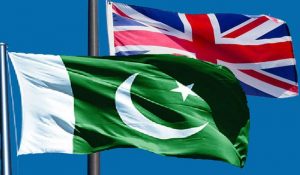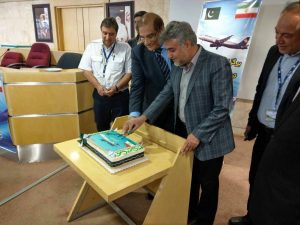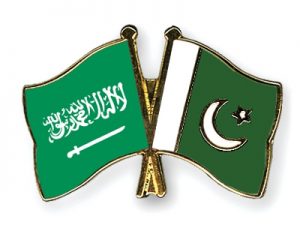
https://www.thenews.com.pk/amp/232188-UK-to-support-Pak-trade-growth
Open-Ed in the News by UK International Minister for Trade Greg Hands
UK Minister of State for Trade Policy 2017 marks 70 years since this country’s birth, and 70 years of bilateral relations between Pakistan and the UK. This is also a momentous time for the UK. As we prepare for our departure from the European Union we will look to strengthen our links across the world to countries like Pakistan where our commitment to trade can secure a more prosperous future for our citizens.
I have been trying to come to Pakistan for many years, and now as a Minister in the UK’s new Department for International Trade, I have finally had my chance this week. It’s been worth the wait. I’ve found a country with its own proud trading history dating back thousands of years, a modern and vibrant business community and strong ambitions for its future growth.
During my visit, I was able to make clear to ministers and business leaders about the strength of the UK’s commitment to Pakistan. The UK — both as a long-term friend to Pakistan and as a champion of free trade — has long been Pakistan’s advocate in Europe, and we are unashamedly a cheerleader for GSP+ and Pakistan’s inclusion.
As the UK leaves the European Union, I am delighted to be able to announce that the UK plans to continue the GSP+ model which will ensure tariff free access for most Pakistani exports to ensure Pakistan maintains its access into the UK market. Given the UK has always been at the forefront of widening and enriching GSP+, we would certainly be looking to give Pakistan even more access to the UK market once we have left the European Union and can decide our own trade policy for the first time in forty years.
And let’s not forget how important the British market is to Pakistan: 25% of Pakistan’s trade in the EU is with the UK.
Meanwhile large British companies like Standard Chartered, Unilever and Reckitt Benckiser are performing brilliantly here – giving jobs to thousands of people in Pakistan, and supplying innovative, market-leading products to their customers and bringing new innovations.
Yesterday, I visited GSK — a leading British pharmaceutical company — which employs over 2,000 people in Pakistan. It’s a company which really believes in Pakistan, having invested $75 million in manufacturing equipment here in recent years. The four billion pills and other medicines produced at its biggest site in Karachi each year include vaccines which have immunised 24 million Pakistani babies since 2012.
While in Pakistan, I was also able to announce that the UK has doubled from £200m to £400m the amount of money UK Export Finance will provide to help UK do business in Pakistan and help Pakistan’s buyers to access finance to source high-quality UK goods and services.
I was also delighted to announce that the Prime Minister of the UK has appointed Rehman Chishti MP as the new Trade Envoy to Pakistan. He is already well known in Pakistan, and has been championing UK-Pakistan relations for many years, including as the chair of the influential All Party Parliamentary Group for Pakistan in the UK Parliament.
I was also clear about where we need to do more work. 150 British companies working in Pakistan might sound a lot, but given the links between our two countries, there should be many more. Earlier this year, I increased the size of our trade team in Pakistan to boost the trade between our two countries, and as I told staff in our office in Islamabad and Karachi, there are many opportunities we can be helping UK and Pakistani businesses seize. I have challenged the whole mission to promote British businesses in Pakistan – and Pakistani business in the UK – and we will be looking at what more we can do to support that.
Pakistan also has a role to play. Continuing the IMF and World Bank reforms — which the UK is supporting through UK Aid — is vital for Pakistan’s economy. Widening the tax base, and ensuring it is implemented consistently, is also central to a stronger economy and better funded education, infrastructure and other public services. Pakistan’s latest ranking as 144th by the World Bank, out of 197 countries for ease of doing business is an improvement, but there is room for more. It is not simply about attracting more overseas investors — though that helps — it also means Pakistani firms can be more competitive, employ more people and make more profit to invest back into the local economy.
I am optimistic that Pakistan will take on these challenges. In my discussion with Commerce Minister Pervaiz Malik, and others in the government, I saw a commitment to improving, developing and reforming the economy to support its businesses.
Early one morning this week, I was able to visit Taxila. Rightly recognised as one of South Asia’s most important archaeological sites and possibly the world’s oldest city, it was an important staging post in the Silk Road. Over two thousand years ago, people from across Europe and Asia were trading across thousands of miles. Nowadays Pakistan is again at the crossroads of major global trading routes, with China on its border. Championing that trade and its opportunities will bring huge benefits for Pakistan’s people.
We in the UK are equal advocates for trade, as our Prime Minister has made clear, the UK must be a champion of free trade around the world. That is why we are clear that trade between our two countries is vital to the interests of both our businesses, economies and people.

Iran’s ‘Kish Airline’ has commenced direct flights between capitals of Iran and Pakistan as the first direct flight between Tehran and Islamabad; a step which would further boost bilateral ties.
An Airbus 321 of Kish Airline landed in Islamabad on Tuesday with 46 passengers on board and returned to Tehran after a while taking passengers from Pakistan to Iran.
A special ceremony was held on the occasion at Islamabad airport in the present of a representative from the Iranian Embassy.
Kish Airline will operate weekly flights (every Tuesday) between Tehran and Islamabad.
The direct flights between Tehran and Islamabad make the expensive, long and tiring journeys easier as now it would take just three hours to reach Tehran from Islamabad.
With the addition of Kish Airline, number of direct flights between Iran and Pakistan has reached to four.
Direct flights between Iran and Pakistan have previously been launched by three other Iranian airlines including the Iran Air, Taban Air and Mahan Air.
The direct flights operation between Tehran and Islamabad would benefit trade and business communities of the two countries providing healthy atmosphere for joint economic activities and boosting bilateral trade ties.

https://www.thenews.com.pk/print/231755-Saudi-Arabia-to-join-CPEC-soon-envoy
ISLAMABAD: Ambassador of Saudi Arabia to Pakistan Nawaf Saeed Ahmed Al-Malkiy has said that his country will soon join the China Pakistan Economic Corridor (CPEC) and make investment at Gwadar Port to play a role in the progress and prosperity of Pakistan.
In a panel interview to The News/Jang, ambassador of Saudi Arabia to Pakistan spoke on the issue of brotherly relations, strategic and bilateral trade relations between the two countries and said that solid steps were being taken for enhancement of trade between the two brotherly countries.
He said in the recent visit of Prime Minister Shahid Khaqan Abbasi to Saudi Arabia where he held meeting with the crown prince of Saudi Arabia and it was agreed in the meeting that new avenues be explored for enhancing the trade volume between the two countries.
Nawaf Saeed Ahmed Al- Malkiy said that the people of Pakistan and Saudi Arabia had strong and brotherly relations and these would further be strengthened with the exchange of cultural delegations. “More than three million Pakistanis are playing their role in the progress and prosperity of Saudi Arabia,” he said.
He said Saudi Arabia believed if Pakistan was strong, it would strengthen Saudi Arabia. Saudi ambassador said that Saudi Arabia gave importance to Pakistan Army and strategic relations with Pakistan and it could be gauged with the fact that Chief of Army Staff General Qamar Javed Bajwa after assuming the charge of Chief of Army Staff paid his first visit to Saudi Arabia.
He said that Islamic Coalition forces in the command of General (R) Raheel Sharif were not against anyone and its main aim was to enhance the capabilities in a fight against terrorism. “Pakistan’s role in eliminating terrorism is praiseworthy,” he said.
Nawaf Saeed Ahmed Al-Malkiy said that the objective of giving the command of Islami coalition forces to General (R) Raheel Sharif was to enhance the capacity building of the defence forces against terrorism and exchange and share the intelligence information. He said Islam is religion of peace and it was must that scholars and intellectuals should sit together for creating harmony through interfaith dialogue. “Saudi Arabia believes that interfaith dialogue is the need of time as Islam is misunderstood in Europe and Islam is a religion of peace and it has nothing to do with the terrorism,” he said and added that a King Abdullah Center was established in Riyadh, which was working for the interfaith dialogue.
He said in the recent years, the interfaith dialogues were held in the United Sates and also in other countries which would not only help in creating interfaith harmony but also understanding the real message of Islam, which is peace.
Saudi ambassador said during the recent visit of Prime Minister Abbasi to Saudi Arabia where he held meeting with Crown Prince of Saudi Arabia, it was decided to establish two groups for enhancing the bilateral trade between the two countries.
He said Pakistan and Saudi Arabia agreed to further enhance the cooperation in the fields of health, education, sports and others.
He said Saudi Arabia would offer scholarships to Pakistani students in universities of Saudi Arabia in electrical and mechanical engineering, science and technology and in other fields and the process in this regard would be started in next two to three weeks. “The exchange of experts and cultural delegations would be ensured between the two countries,” he said.
In a reply to a question, he said, “The Muslim youth needs opportunities in the fields of science and technology as we could compete with the world only through excellence in science and technology.”
To another question, he said Saudi Arabia had proud that every Pakistanis was ready to defend the Harmain Sharifain.